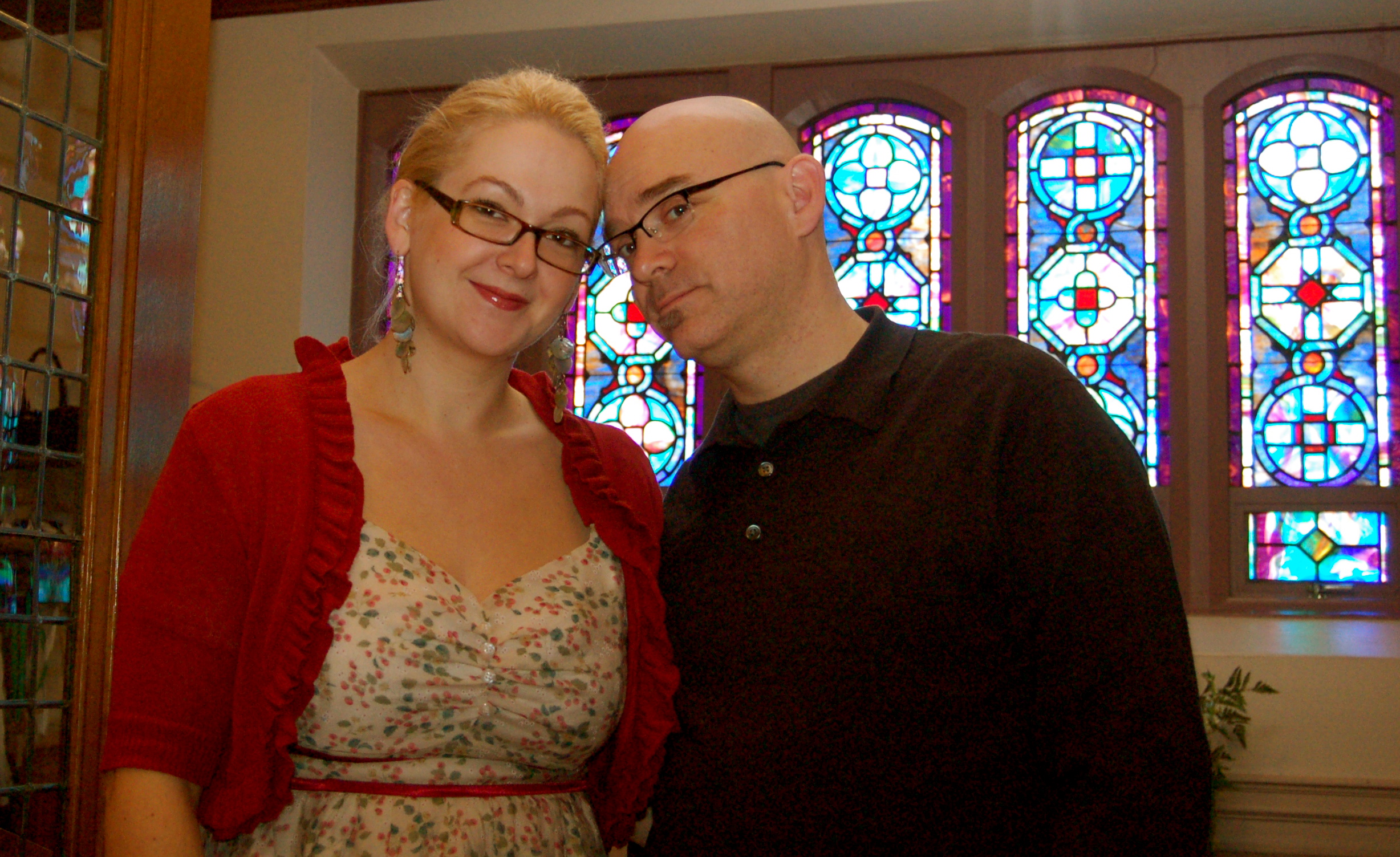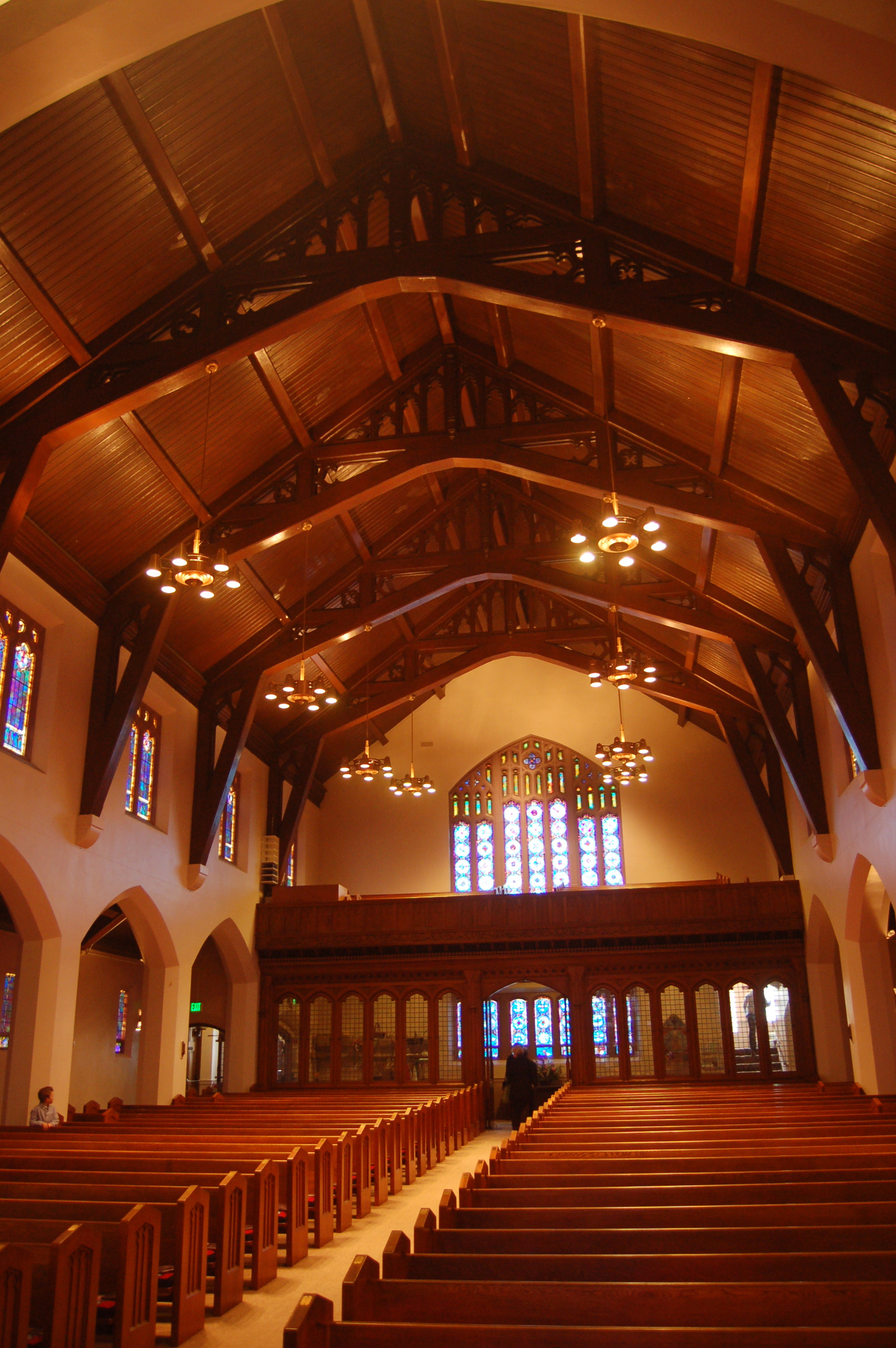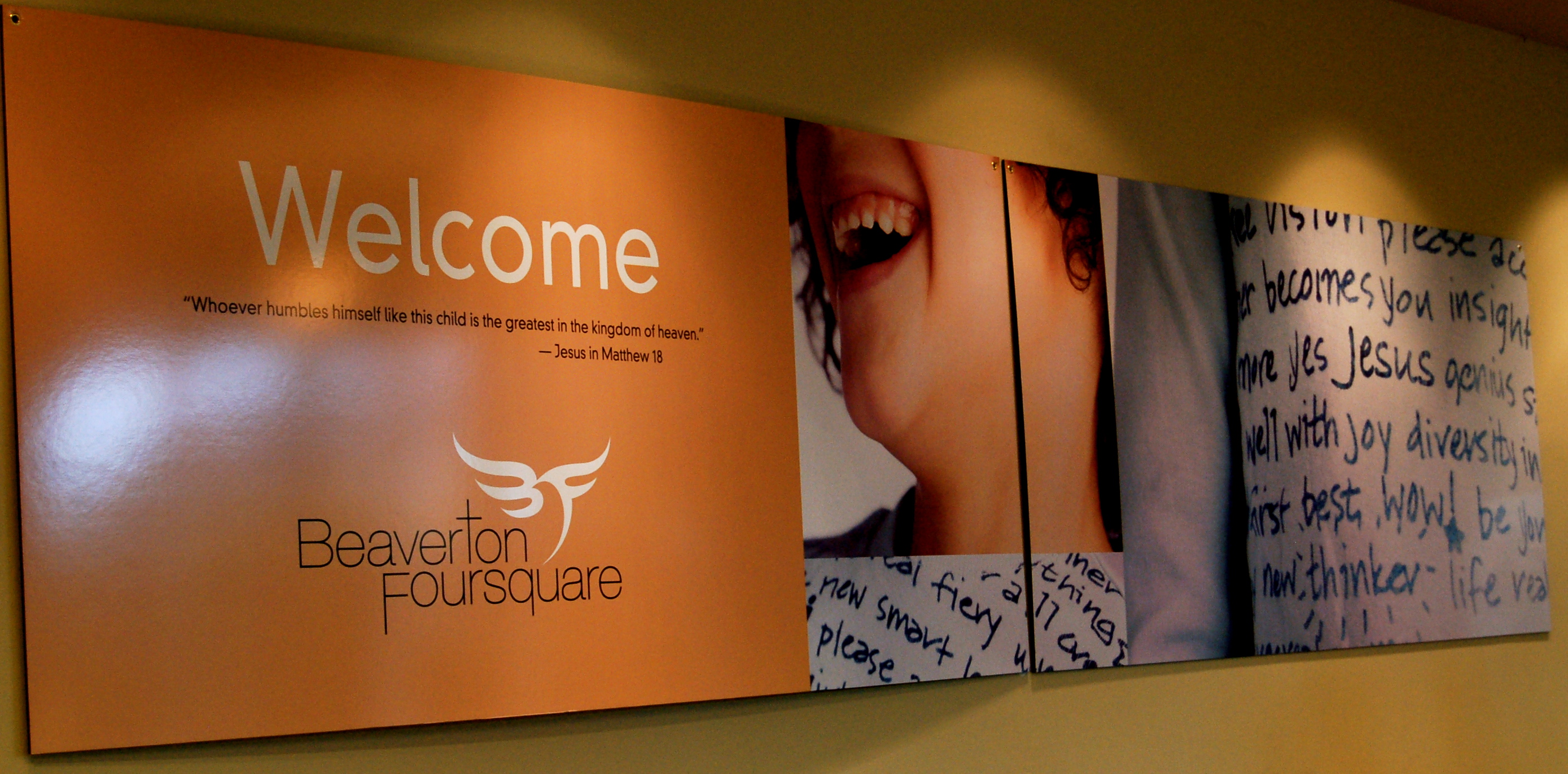
Ever since sound engineer Frank Laico laid down the tracks to Miles Davis’ ‘Round About Midnight in an old Armenian church in 1955, jazz musicians have eagerly sought out echoey old houses of worship to convert into recording studios.
As if we need further proof that man is evolving.
That must have been the thinking behind Westminster Presbyterian Church‘s decision to offer occasional “jazz worship services” throughout the year. Built in 1892, the massive stone building is topped off with a lofty exposed timber ceiling that delivers an open, “live” ambiance. As it happens, the jazz worship service we attended this Sunday coincided with the Portland Jazz Festival.
And talk about a match made in heaven. What better way is there to endure the rigors of church than with a jam session! Apparently pulled from local church members, the sextet performed several tightly arranged church hymns, giving the horn players plenty of space to stretch out in their solos. Local singer Gus Reeves supplied tobacco-warm vocals on a tune or two. My only wish is that these musicians should get together more regularly. It would have also helped if the congregation applauded after each solo and song. The music was slightly stiff, as if, for these players, a blues progression and the mantle of Christ were an awkward fit.
But hey, who am I to carp on such things? When the congregation was called upon to join their voices in a cool early 60s-esque bossa nova rendition of “The Deep, Deep Love of Jesus,” it was like stepping into a James Bond movie theme from an alternate universe. That’s a church I can get into.
At other houses of worship, when the collection plate is passed, the pianist will plink out a vaguely New Age devotional tune. But these Presbyterians definitely improved that necessary evil by stomping out the New Orleans second line march “The Devil Done Got Me Blues.” I noticed an unusually large number of 20 dollar bills lying in the bottom of the plate as it glided by. Inspired music choice, indeed.
The only sour note came, not from the musicians, but from the worship service itself. I’m talking about the Call to Confession, which demands that the entire roomful of people rise and recite:
“Ever-present God, we confess that we have trusted our narrow understandings rather than seek your will. We have taken our direction from the world rather than question the way things are ordered here. We have put our confidence in riches and worldly status. We have closed our ears to your call and, when we have heard that call, defied it. [Here’s the part that really gets me:] Even when we have followed we have resisted the evidence of your activity in our midst. Forgive us and save us from ourselves, for Jesus’ sake. Amen.”
Jesus. What a downer. And even when we’re doing it right, we’re still doing it wrong. With the Presbyterian God, you can’t win for losing.
This idea that we are miserable, disobedient sinners, dependent on God’s charity, just doesn’t sit with me. If, 2000 years after Jesus died, mankind is still as pathetically lost as ever, I have to wonder if his crucifixion has really delivered on its promise. (Before you start filling up the comments box informing me about how the ransom works, trust me, I already got that lesson. Still, my point stands.) While the Buddhists are lighting up incense sticks and blissing out, the Christians are beating the hell out of themselves, convinced they don’t deserve that happiness.
This “I’m a miserable sinner” theology runs counter to what I see as the only redeeming aspect of Christianity: grace.
I love the idea of divine grace, where goodness emanates from God whether we want it or not. It’s such a powerful concept that it outshines any need for redemption. The problem with mainline churches is that they cut the idea short, attaching strings where there were none before. The Catholics believe grace is bestowed on an individual when he or she accepts the sacraments, while most Protestants demand that you have to do you part by maintaining a relationship with God. The idea is that you must take steps to make yourself deserving of what is by definition undeserved. So I call bullshit.
You know who taught me more about grace than anything I’ve learned so far sitting in a pew? Alfred Hitchcock. (Hey, you get devotional your way, I’ll get devotional mine.) His 1955 comedy The Trouble With Harry, in which a community repeatedly digs up and and reburies a corpse they’ve discovered in the woods, goes straight to the heart of the matter.
The Trouble With Harry is about human grace in the face of horror. As the characters in the film encounter the dead body, each imagines him- or herself to be responsible for his death. Captain Wiles (Edmund Gwenn), for instance, thinks he may have shot him in a hunting accident, while Jennifer Rogers (21-year-old hottie Shirley Maclaine in her first film role) believes she killed him when she struck him over the head with a milk bottle. Yet, there is no judging, suspicion or recrimination. The townspeople accept each other for what they are, seeing themselves in the others’ humanity and empathizing with their various predicaments. They seem to agree, that, after all, there are more important things in life than death. That’s why no one gets bent out of shape over Harry’s demise as they repeatedly disinter his body. (If you’ve already picked up on some religious symbolism, that’s because it’s there. There’s even a morally myopic, authoritarian town sheriff named Calvin.)
In that film, Hitchcock replaced the Protestant saying, “there but for the grace of God go I,” with the nobler, simpler and more universal “there go I”—regardless of whether that person is a criminal or a saint. Which is to say, the characters in Harry live in a state of grace. I think I can identify with that.
I’ve rejected Christianity and the existence of a central God; I never pray; I go to other people’s places of worship, laugh at their rituals and write snarky blog posts about it. I drink, smoke and fornicate. Yet, for all of this, I feel cared for, cosmically speaking. No matter how dicey things may look, I know without any doubt that my needs will be met. Oddly enough, the farther I run from God, the stronger my faith gets. Why should I hang my hopes on the debatable value of a Jewish mystic’s grisly murder? It just seems so irrelevant. If this isn’t grace, I’m caught up in one hell of a delusion.
If you’re a believer, you might be thinking—maybe even hoping—that my comeuppance will befall me soon enough. Maybe it will. Hitchcock had an answer for that, too. In Shadow of a Doubt, Merry Widow Murderer Uncle Charlie (Joseph Cotten) reminds us that “God looks out for fools and scoundrels.”
As it happens, the sermon this Sunday had to do with just that topic. It was based on 1 Corinthians 3:18: “If any of you think you are wise by the standards of this age, you should become ‘fools’ so that you may become wise.”
The minister, Debbie Garber, made an interesting point. In the theater, the “fool” is both an insider and an outsider. He is someone who understands the value of living by society’s conventions, but who also sees the atrocities that sometimes arise from doing so—and he speaks his truth about both. In the comments section of this blog, Amanda and I have been called fools for embarking on A Year of Sundays. They might be right. I’ll bet that Jesus, wherever he is, is laughing his ass off.


